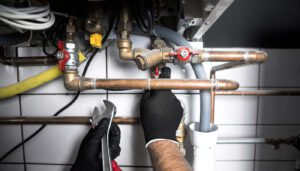Plumbing is a field that involves the conveyance of fluids in a variety of applications. It makes use of pipes, valves, plumbing fixtures, tanks, and other apparatuses. Learn about what you can expect from a plumbing apprenticeship and how to become a plumber. Also, find out what the career outlook is like.

There are many lessons to be learned during a plumbing apprenticeship. During your apprenticeship, you will learn to diagnose plumbing problems, change plumbing components, and clear clogs. You will also learn the various tools and equipment used in the plumbing trade. It is important to know how to choose the correct equipment.
Plumbing is a service-oriented profession, and it requires a strong work ethic. You will need to be detail-oriented, independent, and able to persevere under difficult circumstances. You will also need to be able to listen to your clients and your senior plumbers. The plumbing apprenticeship will teach you to become a good communicator.
Plumbing apprenticeships also teach you soft skills like customer service and calculation. Plumbing jobs often require careful paperwork, so it is essential to learn these skills. Plumbing apprentices should also be well-organized and patient. They should be eager to learn and understand, and they should never be afraid to ask questions.
Apprenticeships in plumbing are a great way to start a career. They combine classroom learning with hands-on experience. Typically, these programs last two to five years. During this time, you can earn money while you are training, and your earnings will increase as you progress. Plumbing apprenticeships are the primary route to a career in plumbing.
An apprenticeship program in plumbing includes on-the-job training and night classes. The plumbing industry is highly competitive, and plumbers are in high demand. Some states are experiencing a shortage of plumbers. Those who complete this program are guaranteed a minimum wage of $21 an hour upon graduation.
Most apprenticeship programs require you to take additional classes before becoming a licensed plumber. You must be able to make time to attend these classes. Plumbing classes are typically taught by certified instructors. Some of these classes provide general training, while others focus on more specific topics. A plumber will need to have a strong understanding of plumbing terms and techniques.
Plumbers have a variety of tools that can help them fix leaks and clogs. Some of these tools are specialized for a plumber’s job, while others are common household items. Plumbers also use specialized equipment for soldering, which is a process of melting metals together. Plumbers must wear protective gear while working with these tools, such as heat shields, to prevent injuries and heat damage.
Plumbing tools can include pipe cutters and soldering tape. A plumber can use soldering tape to fix joints between pipes. The tape can be heat-resistant, and it will preserve the integrity of the pipes. Another tool used by plumbers is pipe glue, which is used to make a water-tight seal around the mouth of PVC pipes. Plumbers also need to use a pipe support system in order to minimize vibration and distribute the weight of the water as it passes through the pipes.
Other tools used by plumbers include a jackhammer, a wire cutter, and a drill machine. A plumber can use these tools when repairing or installing a new bathroom. Power tools help a plumber fix a variety of problems, including clogging and leaks. Power tools are especially useful when heavy work needs to be done in a bathroom. These tools are very versatile and can be used for cutting, drilling, sawing, and grinding.
An adjustable wrench is another handy tool that a plumber needs. These tools come in many different sizes and are ideal for working on large bolts and nuts. They have a telescoping handle for greater reach. Another tool for a plumber is an automatic drain auger. This tool is extremely helpful for clearing clogs, as its flexible shaft can snake around bends and curves.
A hammer and drill are two of the most common tools used by a plumber. These tools are extremely versatile and are essential for every job.

